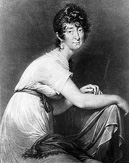 Franziska (Fanny, Voegelchen) von Arnstein was born in Berlin, Germany, in 1757, the daughter of Daniel Itzig of Berlin, Master of the Mint and one of the most influential Jews in Prussia at the time. Of Daniel’s sixteen children (eight daughters), Fanny was considered the most beautiful and talented. She left Berlin and moved to Vienna in 1776 where she was detemined to surround herself with a circle of people with liberal views in arts, religion, and philosophy. She herself was very talented in music, as a pianist and singer. Fanny was accepted to the high society in Vienna, in spite of the negative attitude of the Empress Maria Theresia towards the Jews, partly because the aristocrats’ behaviour towards the Jews was better than that of the throne, but especially because Fanny’s charm. Fanny’s intimate friend was the younger wife of the Court Secretary.
Franziska (Fanny, Voegelchen) von Arnstein was born in Berlin, Germany, in 1757, the daughter of Daniel Itzig of Berlin, Master of the Mint and one of the most influential Jews in Prussia at the time. Of Daniel’s sixteen children (eight daughters), Fanny was considered the most beautiful and talented. She left Berlin and moved to Vienna in 1776 where she was detemined to surround herself with a circle of people with liberal views in arts, religion, and philosophy. She herself was very talented in music, as a pianist and singer. Fanny was accepted to the high society in Vienna, in spite of the negative attitude of the Empress Maria Theresia towards the Jews, partly because the aristocrats’ behaviour towards the Jews was better than that of the throne, but especially because Fanny’s charm. Fanny’s intimate friend was the younger wife of the Court Secretary.
Fanny paved her way to success after being befriended with Joseph von Sonnenfels, a baptised Jew and a great social reformer. She attended Mozart’s concerts, and mixed with aristocrats and wealthy Jews converted to Christianity. For some Austrian writers she became an object of admiration.
After Emperor Joseph issued his “Patent of Tolerance”, Fanny gained a dominant role in Austrian society. In the 1790’s her intimate friends included foreign princes and Austrian nobleman. One of the princes lost his life in a duel for her. She travelled a lot to Berlin, her native city, from which she brought new ideas and books which were discussed in her three salons, where many members of the European Aristocracy assembled. She was of course assisted by the wealth and power of her husband, but her energy, drive and love of arts contributed even more to her success. They were both enobled to the rank of Baron in 1798. Fanny was co-founder of the Musical Society (1812), which exists till today.
During the Vienna Congress (1814-1815), she held receptions and musical events every Tuesday night, which were attended by the European statesmen and nobility. Fanny, like her husband, remained all her life Jewish, and was buried accordingly. Because of Fanny’s belief that all religions were equal before God, she did not object her only daughter’s convertion to Christianity.